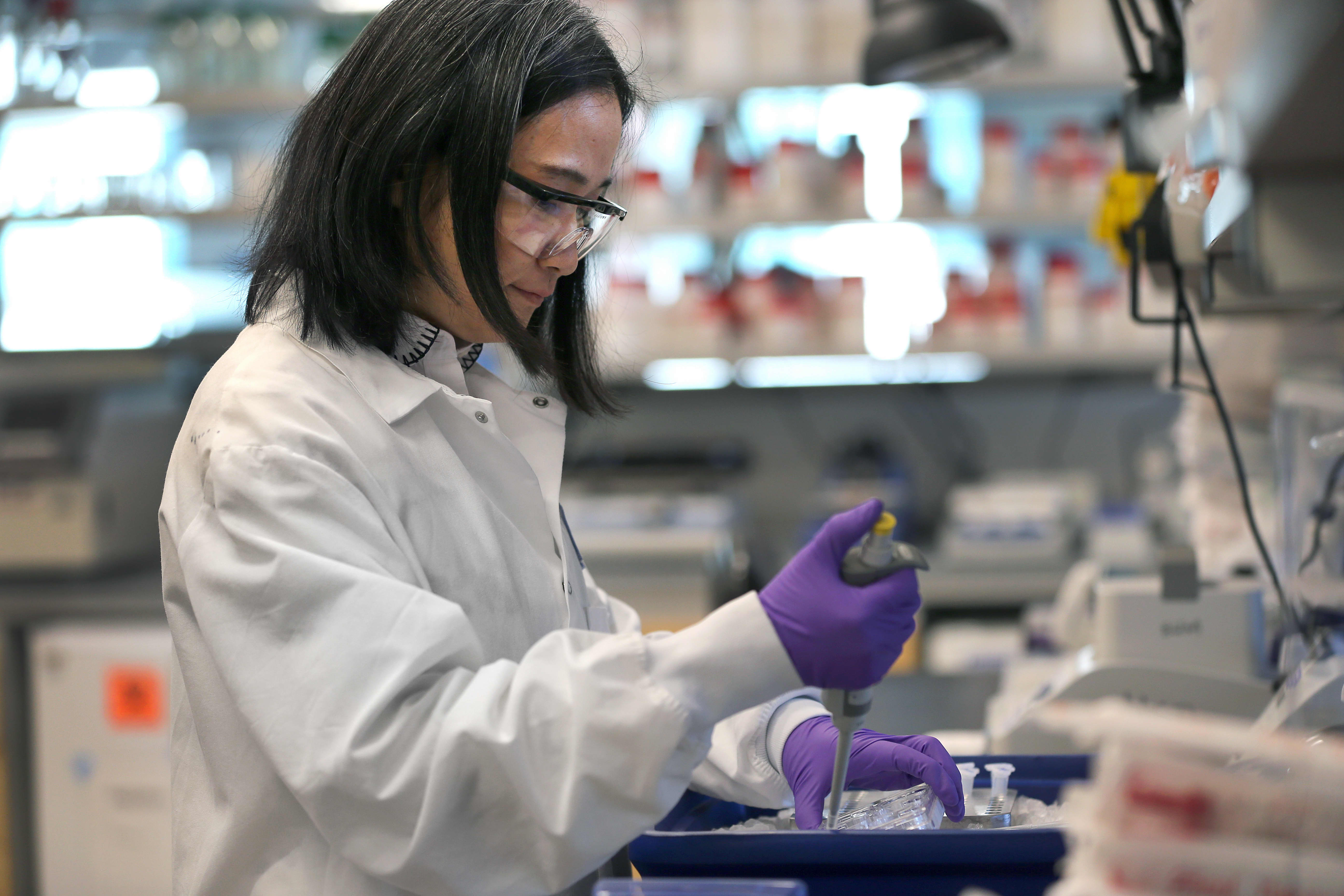
Scientist Xinhua Yan works in the lab at Moderna in Cambridge, MA on Feb. 28, 2020. Moderna has developed the first experimental coronavirus medicine, but an approved treatment is more than a year away.
David L. Ryan | Boston Globe | Getty Images
Scientists around the globe are racing to develop tests, treatments and vaccines to combat the COVID-19 disease.
Near term, tests are the priority. Beyond testing, regulators are trying to get treatments approved as quickly and safely as possible to serve as a bridge to a vaccine, which is likely to take 12 months, according to the U.S. FDA Commissioner Stephen Hahn.
Health-care experts broadly agree that a treatment is likely to come before a vaccine. "If a good treatment emerges, whatever it is, we expect regulators to prioritize expeditious review," Laura Sutcliffe, a UBS health-care analyst said in a research note.
Treatments
U.S. regulators are leaning heavily on previously developed treatments. At a press conference with President Donald Trump, the FDA commissioner confirmed the agency is currently looking at drugs already approved for other diseases. Several therapies have been thrust into the spotlight in recent days for their promise: Gilead's remdesivir, Regeneron's kevzara and generic antimalarial drug chloroquine (and an alternative version called hydroxychloroquine).
Remdesivir was developed by U.S. pharma giant Gilead Sciences Inc and was previously tried as a treatment for Middle East Respiratory Syndrome (MERS), another type of coronavirus, and Ebola. Remdesivir is currently in clinical trials and is also permitted for compassionate use — meaning it can be used to treat a severely ill patient when no other treatments are available. The Credit Suisse pharma team note that this is the most advanced novel therapy, but they have concerns about supply.
Biotech giant Regeneron Pharmaceuticals is trialing its drug kevzara for use against COVID-19. It is currently used to treat rheumatoid arthritis. Regeneron co-developed the drug with French health-care firm Sanofi.
Chloroquine is a generic malaria drug which has shown promise as a treatment against COVID-19. German biosciences conglomerate, Bayer, announced Tuesday it has donated 3 million tablets of its malaria drug resochin which is made of chloroquine phosphate, to the U.S. government to aid in the fight against the virus.
The Credit Suisse pharma team see manufacturing and supply as the key challenge for the majority of proposed COVID-19 therapies and, in due course, vaccines: "A global pandemic requires a huge volume of drug in a very short space of time. Stocks of legacy drugs, new drug candidates will take months to build, in our view."
Vaccines
Usually vaccine development takes more than five years and requires significant capital investment. This lengthy process has created problems in the past, for example with Ebola.
But the scientific community is better prepared now than it was for Ebola, argues Sutcliff. A body was set up to coordinate developing vaccines for pandemics and researchers can now leverage work done during previous outbreaks to propel them forward.
While meaningful progress has been made in recent weeks, in particular from biotech firms specializing in mRNA molecules (these are used to instruct the body to produce its own response to fight a range of diseases) like Moderna and BioNtech, this approach has been more successful in veterinary medicine than in humans. There is no guarantee they will be successful. In parallel to the work being done by these biotech firms, traditional pharma giants like GlaxoSmithKline and Sanofi are leaning on their experience dealing with seasonal flu to try to come up with an immunization. But even then, there is no guarantee of success.
Testing
Several countries, in particular the U.S. and the U.K. are facing heavy criticism from health-care experts over testing. British Prime Minister Boris Johnson said Thursday the U.K. is in negotiations to buy hundreds of thousands of tests which would be able to detect whether someone has had COVID-19 by checking the presence of antibodies. He argued this could turn the tide in the fight against the virus.
A continuous process
Health-care companies and regulators have a fine balancing act to maintain: They must race against the clock to get effective treatments and vaccines to market, but they must also ensure those treatments do not have negative effects on patients.
That requires rigorous and time-intensive clinical trials. This is a continuous process and every aspect of the solution matters — from testing to treatment to immunization.
"come" - Google News
March 20, 2020 at 08:09PM
https://ift.tt/2QNvivt
Hopes are high for a coronavirus treatment, which could come much quicker than a vaccine - CNBC
"come" - Google News
https://ift.tt/2S8UtrZ
Shoes Man Tutorial
Pos News Update
Meme Update
Korean Entertainment News
Japan News Update
Bagikan Berita Ini














0 Response to "Hopes are high for a coronavirus treatment, which could come much quicker than a vaccine - CNBC"
Post a Comment